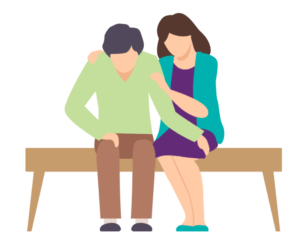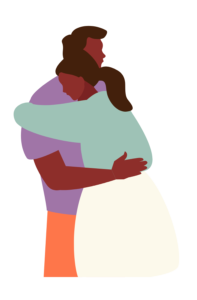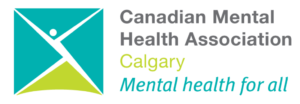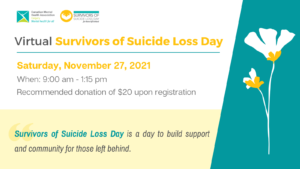How To Confront Your Grief & Loss
CMHA Calgary offers counselling to family members or friends living and coping with a relative or significant other who is suffering from a mental health issue, grief and loss counselling for those struggling with death and non-death grief and loss, as well as suicide bereavement counselling for those individual survivors, families and couples to develop an enhanced understanding of their own grief process.
The Grief and Loss Program at CMHA Calgary is designed for those struggling with death and non-death grief and loss experiences such as job loss, managing anxiety and fear, and making meaning after loss.
Kara, one of CMHA Calgary’s counsellors, says confronting your grief and loss in a clinical way is a big step in the healing process.
“There is research to show that people who have had grief counselling, and even grief counselling early on, do fare better in the long run.”
Receiving this kind of counselling, especially when it comes to grieving a loss by suicide, can decrease long-term feelings of isolation and loneliness.
“Up to 500 people a year die of suicide in Alberta, but a lot of people just haven’t been able to connect with other people who’ve had a similar loss.” – Kara
Support From a Counsellor

Through our Suicide Bereavement Counselling, individuals are supported through one-to-one interactions where they receive healthy coping strategies in order to stay well after their loss.
Alternatively, our Suicide Bereavement Drop-In Group provides a safe and confidential space for those who have experienced a loss by suicide to share, network, and meet other people with similar experiences. Hosted by a CMHA Calgary counsellor and peer volunteer survivor, every drop-in session is free of charge and held over Zoom.
To find out more information about CMHA Calgary’s grief and loss, and suicide bereavement counselling, please contact counsellingintake@cmha.calgary.ab.ca.
Learning From Lived Experience
Outside of counselling supports, Kara says doing your own research can give you peace and mind about your loss.
“Dr. Alan Wolfelt is a great author who has a lot of [informative] books on grief. He has a few based on suicide loss as well as accompanying journals to jot down and follow along [in your grieving journey].”
- Understanding Your Suicide Grief: Ten Essential Touchtones for Finding Hope and Healing Your Heart
- The Wilderness of Suicide Grief: Finding Your Way
- The Understanding Your Suicide Grief Journal
Founder and Director of the Center for Loss and Life Transition, Dr. Alan Wolfelt is a death educator and grief counsellor dedicated to supporting grievers and bereavement caregivers. With his own personal connection to loss, Dr. Wolfelt uses his teachings to help people mourn and heal.
Meaningful Connection

Whether it’s reaching out to family and friends, a support group, or through an online group, creating a supportive network can help you tremendously when grieving.
“Connecting to anything that’s meaningful to you is very important,” said Kara.
Although it’s difficult not to let your loss consume all your thoughts and actions, it’s important to remember the meaningful people, things, and places that bring you a sense of comfort and happiness, even during difficult times.
“Resiliency to me is a characteristic that helps people manage anything from the minor daily set backs we all experience, to traumatic events and major life changes. Resiliency is something that can be developed throughout the life time. Building resiliency happens in many different ways. It can happened by attending events such as the SOSLD in November, and also through lived experience just to name a few.”
Survivors of Suicide Loss Day
Coming up on Saturday, November 27, 2021, CMHA Calgary will be hosting our annual Survivors of Suicide Loss Day – a one day event for individuals who have lost someone to suicide (parent, child, spouse/partner, aunt, uncle, cousin, niece, nephew, friend, or extended relationship) to come together and connect in a supportive environment. CMHA Calgary works with a dedicated group of devoted volunteers to present a day of support, healing, information, connection, and hope for those left behind.
“What’s beneficial about Survivors of Suicide Day is that it’s just a great way for other people to meet other people with a similar lived experience. A lot of the times when somebody or when someone loses someone to suicide, they feel very isolated and alone,” said Kara.
Whether your loss happened recently or a long time ago, our day provides a very open and non-judgmental atmosphere where everyone understands.
“There are people who have been coming for years and years and years. There are some people who’ve their loss was 20 years ago so it’s nice for participants to come and meet other people who have come a long way in processing their grief to kind of see almost that kind of role model of this is you know, this is how the future can look for me because this is how other people have dealt with this and kind of come out and come out on the other side,” said Kara.
This year’s keynote speaker will be Dr. Michael Ungar, a Family Therapist and Professor of Social Work at Dalhousie University, who will speak about Nurturing Resilience and Finding the Personal Qualities and Social Supports We Need to Thrive.
For more information or to register for Survivors of Suicide Loss Day, click here.
Kara is a registered provisional psychologist, and has a Master’s degree in Counselling Psychology. She has worked as a counselling therapist with CMHA Calgary since 2019. Kara has worked in CMHA Calgary’s suicide bereavement and family support program offering counselling to individuals, groups and families.

Our Peer Support program services can be accessed over the phone at 403-297-1402 or through email at peer@cmha.calgary.ab.ca. We have teamed up with other Calgary agencies to help Calgarians quickly and easily access various counselling and social supports. Visit www.communityconnectyyc.ca, where you can book online for our Suicide Bereavement and Family Support Counselling, and other supports. If you prefer to still book through us, please phone (403-297-1708), or email (counsellingintake@cmha.calgary.ab.ca).
